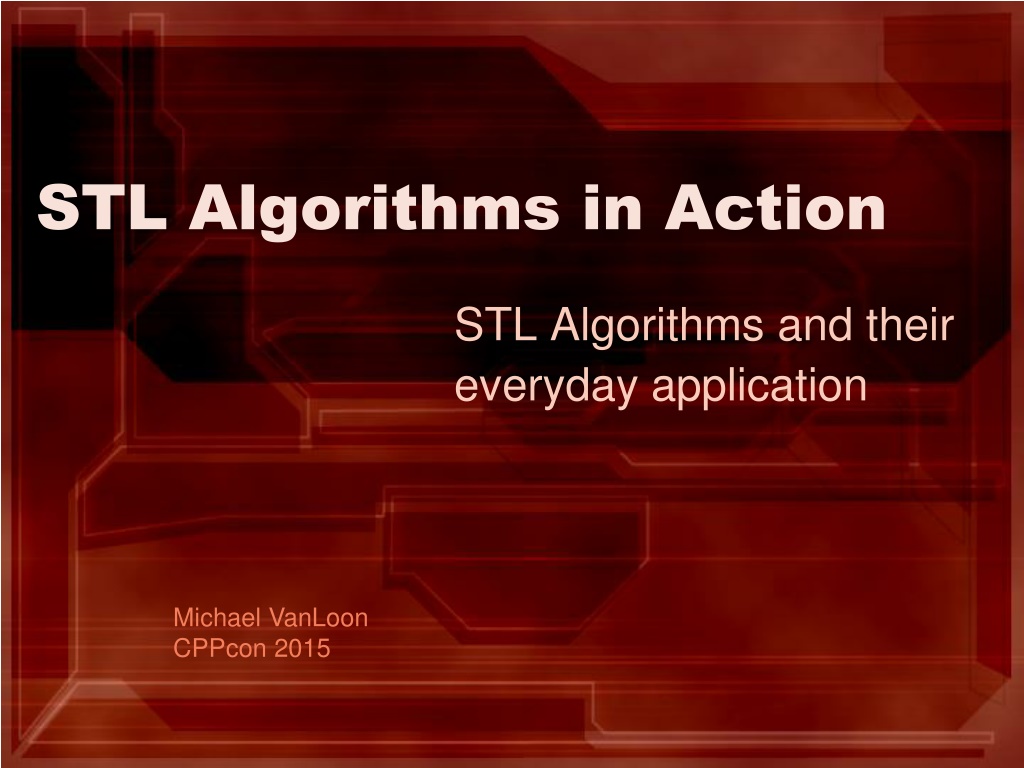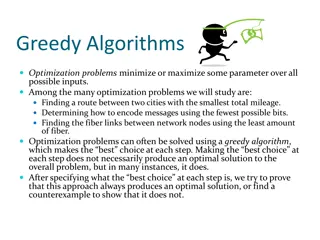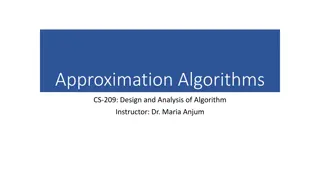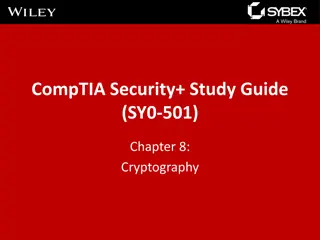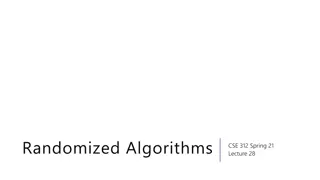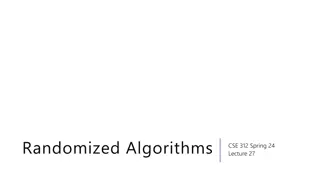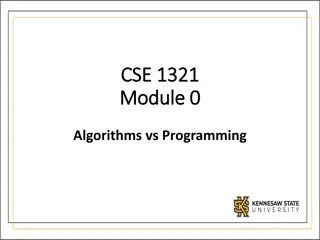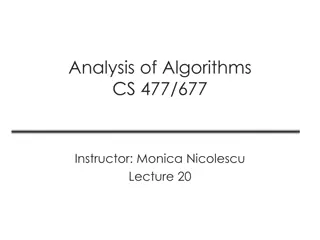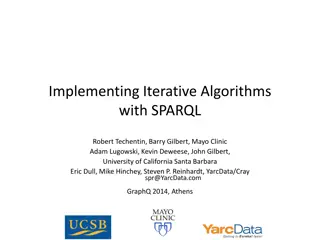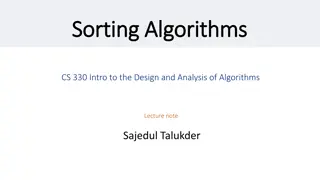Understanding STL Algorithms: A Practical Guide
Explore the world of STL algorithms through an insightful discussion on the definition of algorithms, the advantages of using STL algorithms over raw loops, and the different classes of STL algorithms available. Discover how these pre-built libraries can enhance your programming efficiency and code readability.
Download Presentation

Please find below an Image/Link to download the presentation.
The content on the website is provided AS IS for your information and personal use only. It may not be sold, licensed, or shared on other websites without obtaining consent from the author. Download presentation by click this link. If you encounter any issues during the download, it is possible that the publisher has removed the file from their server.
E N D
Presentation Transcript
STL Algorithms in Action STL Algorithms and their everyday application Michael VanLoon CPPcon 2015
What are algorithms? al go rithm noun: algorithm; plural noun: algorithms A procedure for solving a problem (as of finding the greatest common divisor) in a finite number of steps that frequently involves repetition of an operation; broadly: a step-by- step procedure for solving a problem or accomplishing some end especially by a computer. Merriam-Webster dictionary STL Algorithms in Action Michael VanLoon - http://codeache.net - CPPcon 2015 2
What are STL algorithms? A pre-built library of general-purpose algorithms designed to solve specific problems Come for free with your C++ compiler Operate on sequences or sequenced containers Declarative in syntax no explicit ( raw ) loops Iterate over some or all members of a sequence performing an operation on each element in turn Designed by experts and proven bug-free by the millions of lines of other peoples programs that already use them! STL Algorithms in Action Michael VanLoon - http://codeache.net - CPPcon 2015 3
What is a raw loop anyway? It s a for, while, or do while loop Explicitly coded Often contains many lines of code (should it?) May cause side-effects outside its scope vector<int> out; bool found = false; for (const auto& i: v) { if (i >= 42) { out.emplace_back(i); ++global_count; if (i == 42) { found = true; } } } STL Algorithms in Action Michael VanLoon - http://codeache.net - CPPcon 2015 4
Why use algorithms? Often more efficient than hand-written loop Cleaner and more clearly abstracted than a raw loop Contains side-effects inside a clear interface Prevents accidental leakage of side-effects Eases reasoning about functionality and reasoning about post conditions Less likely to fail under non-obvious conditions Eases reasoning about the surrounding code STL Algorithms in Action Michael VanLoon - http://codeache.net - CPPcon 2015 5
Classes of STL algorithms Non-modifying sequence operations (25.2) Mutating sequence operations (25.3) Sorting and related operations (25.4) General C algorithms (25.5) General numeric operations (26.7) (section of the C++ standard INCITS/ISO/IEC 14882-2011[2012]) STL Algorithms in Action Michael VanLoon - http://codeache.net - CPPcon 2015 6
STL algorithms non-modifying sequence operations Do not modify the input sequence. Do not emit a result sequence. Algorithm will not cause side-effects in input sequence. Function object, if present, may cause side- effects by modifying itself, the sequence (in certain cases, e.g. for_each), or its environment. STL Algorithms in Action Michael VanLoon - http://codeache.net - CPPcon 2015 7
STL algorithms non-modifying sequence operations all_of any_of none_of for_each find find_if find_if_not find_end find_first_of adjacent_find count count_if mismatch equal is_permutation search search_n STL Algorithms in Action Michael VanLoon - http://codeache.net - CPPcon 2015 8
STL algorithms mutating sequence operations Do not modify the input sequence, except in situations when output overlaps input, resulting in modification in- place (e.g. transform). Emit an output sequence of results. Output sequence may potentially overlap input sequence for certain algorithms (e.g. transform). Others (e.g. copy) explicitly disallow overlap/in-place. Algorithm will explicitly cause side-effects in output sequence. Function object, if present, may cause side-effects by modifying itself or its environment. Function object should not modify the input or output sequences. STL Algorithms in Action Michael VanLoon - http://codeache.net - CPPcon 2015 9
STL algorithms mutating sequence operations copy remove unique reverse rotate shuffle partition is_partitioned stable_partition partition_copy partition_point copy_n copy_if copy_backward remove_if remove_copy remove_copy_if move move_backward unique_copy swap_ranges iter_swap transform replace replace_if replace_copy replace_copy_if fill fill_n generate generate_n reverse_copy rotate_copy random_shuffle STL Algorithms in Action Michael VanLoon - http://codeache.net - CPPcon 2015 10
STL algorithms sorting and related operations A mix of non-modifying and mutating operations Mutating operations modify sequences in place (e.g. sort, make_heap), or emit output to an output sequence (e.g. merge, partial_sort_copy) Default compare function is operator< Explicit compare function object, if supplied, must not modify the sequence or iterators STL Algorithms in Action Michael VanLoon - http://codeache.net - CPPcon 2015 11
STL algorithms sorting and related operations sorting nth_element binary search lower_bound upper_bound equal_range binary_search merge merge inplace_merge set operations on sorted structures includes set_union set_intersection set_difference set_symmetric_difference heap operations push_heap pop_heap make_heap sort_heap minimum and maximum min max minmax min_element max_element minmax_element lexicographical comparisons lexicographical_compare permutation generators next_permutation prev_permutation sort stable_sort partial_sort partial_sort_copy STL Algorithms in Action Michael VanLoon - http://codeache.net - CPPcon 2015 12
STL algorithms general numeric operations Library of algorithms for doing numeric operations. Consist of components for complex number types, random number generation, nu- meric (n-at-a-time) arrays, generalized numeric algorithms, and facilities included from the ISO C library.1 1Description from the standard library that is surprisingly understandable by humans. STL Algorithms in Action Michael VanLoon - http://codeache.net - CPPcon 2015 13
STL algorithms general numeric operations accumulate inner_product partial_sum adjacent_difference iota STL Algorithms in Action Michael VanLoon - http://codeache.net - CPPcon 2015 14
STL algorithms C library algorithms These are shown for completeness. You may need to know about these for legacy reasons. In general, there is nothing these can do that you can t do better with the modern algorithms previously mentioned. STL Algorithms in Action Michael VanLoon - http://codeache.net - CPPcon 2015 15
STL algorithms C library algorithms bsearch qsort STL Algorithms in Action Michael VanLoon - http://codeache.net - CPPcon 2015 16
for_each and transform Your go-to generic algorithms for doing general things to sequences Applies an operation to each element in a sequence, in order Very similar except completely different STL Algorithms in Action Michael VanLoon - http://codeache.net - CPPcon 2015 17
for_each Applies an operation to each element in a sequence (like many algorithms) Is a non-modifying sequence operation Algorithm produces no side-effect Function object may produce a side-effect by modifying the input sequence Function object may produce a side-effect by modifying itself Returns a moved copy of the function object for_each is considered non-modifying because it produces no output range; it relies on the function object for mutation, if any STL Algorithms in Action Michael VanLoon - http://codeache.net - CPPcon 2015 18
transform Applies an operation to each element in a sequence (like many algorithms) Is a mutating sequence operation If the input range(s) and result range are the same, or overlap, mutates objects in-place Algorithm explicitly produces a side-effect Function object may not produce a side-effect transform is considered mutating because it explicitly produces an output range modified by applying the function object to elements, and forbids the function object from modifying any of the range elements or iterators Returns iterator pointing one past last element in result range STL Algorithms in Action Michael VanLoon - http://codeache.net - CPPcon 2015 19
for_each example Generate a single hash for all strings in a vector struct HashString { void operator()(const string& s) { hash = accumulate(s.begin(), s.end(), hash, hash_char); } uint32_t hash = 0; }; STL Algorithms in Action Michael VanLoon - http://codeache.net - CPPcon 2015 20
accumulate Is a non-modifying numerics operation Algorithm produces no side-effect Function object may not modify the sequence or the iterator Function object may produce a side-effect by returning a return code different from input parameter accumulate differs from for_each in that the algorithm carries a value rather than a function object from visit to visit, applying the operation to each element and the current value accumulate differs from for_each in that it has a default operation: operator+ STL Algorithms in Action Michael VanLoon - http://codeache.net - CPPcon 2015 21
for_each example Generate a single hash for all strings in a vector struct HashString { void operator()(const string& s) { hash = accumulate(s.begin(), s.end(), hash, hash_char); } uint32_t hash = 0; }; STL Algorithms in Action Michael VanLoon - http://codeache.net - CPPcon 2015 22
for_each example Generate a single hash for all strings in a vector struct HashString { void operator()(const string& s) { hash = accumulate(s.begin(), s.end(), hash, hash_char); } uint32_t hash = 0; }; template<typename Cont> uint32_t hash_all_strings(const Cont& v) { const auto hasher = for_each(v.begin(), v.end(), HashString()); return hasher.hash; } STL Algorithms in Action Michael VanLoon - http://codeache.net - CPPcon 2015 23
for_each example Generate a single hash for all strings in a vector struct HashString { void operator()(const string& s) { hash = accumulate(s.begin(), s.end(), hash, hash_char); } uint32_t hash = 0; }; template<typename Cont> uint32_t hash_all_strings(const Cont& v) { const auto hasher = for_each(v.begin(), v.end(), HashString()); return hasher.hash; } void test_for_each_hash() { vector<string> v{ "one", "two", "three", "four", "five" }; uint32_t hash = hash_all_strings(v); cout << "Hash: " << hash << dec << endl; } STL Algorithms in Action Michael VanLoon - http://codeache.net - CPPcon 2015 24
for_each example (cont) the rest of the code uint32_t rotl(uint32_t value, unsigned int count) { const uint32_t mask = (CHAR_BIT * sizeof(value) - 1); count &= mask; return (value << count) | (value >> ((-count)&mask)); } uint32_t hash_char(uint32_t hash, char c) { hash = rotl(hash, c); // circular rotate left hash ^= c; return hash; } STL Algorithms in Action Michael VanLoon - http://codeache.net - CPPcon 2015 25
transform example Generate hash for each string in a vector uint32_t hash_string(const string& s) { return accumulate(s.begin(), s.end(), 0, hash_char); }; STL Algorithms in Action Michael VanLoon - http://codeache.net - CPPcon 2015 26
transform example Generate hash for each string in a vector uint32_t hash_string(const string& s) { return accumulate(s.begin(), s.end(), 0, hash_char); }; template<typename Cont> vector<uint32_t> hash_each_string(const Cont& v) { vector<uint32_t> res; transform(v.begin(), v.end(), back_inserter(res), hash_string); return res; } STL Algorithms in Action Michael VanLoon - http://codeache.net - CPPcon 2015 27
transform example Generate hash for each string in a vector uint32_t hash_string(const string& s) { return accumulate(s.begin(), s.end(), 0, hash_char); }; template<typename Cont> vector<uint32_t> hash_each_string(const Cont& v) { vector<uint32_t> res; transform(v.begin(), v.end(), back_inserter(res), hash_string); return res; } void test_transform_hash() { vector<string> v{ "one", "two", "three", "four", "five" }; auto res = hash_each_string(v); cout << "Hashes: "; for_each(res.begin(), res.end(), [](uint32_t rh){ cout << rh << " "; }); cout << endl; } STL Algorithms in Action Michael VanLoon - http://codeache.net - CPPcon 2015 28
any_of, all_of, and none_of Apply a function object to a sequence Determines whether any, all, or none of the elements in the sequence are true as determined by the function object May return before evaluating all elements in sequence if outcome is determined early STL Algorithms in Action Michael VanLoon - http://codeache.net - CPPcon 2015 29
all_of example validate http headers static const regex reHeader("([A-Za-z0-9!#$%&'*+.^_`|~-]+): *(.+) *"); inline bool headers_valid(const vector<string>& headers) { return all_of(headers.begin(), headers.end(), [](const auto& header) -> bool { smatch matches; return regex_match(header, matches, reHeader); } ); } STL Algorithms in Action Michael VanLoon - http://codeache.net - CPPcon 2015 30
all_of example validate http headers test and output void all_of_headers() { vector<string> h1 = { "Foo: bar", "Content-type: application/json", "Accept: text/html,text/json,application/json" }; cout << "headers valid: " << boolalpha << headers_valid(h1) << endl; vector<string> h2 = { "Foo : bar", "Content-type: application/json", "Accept: text/html,text/json,application/json" }; cout << "headers valid: " << boolalpha << headers_valid(h2) << endl; vector<string> h3 = { "Foo: bar", "Content-type: application/json", ":Accept: text/html,text/json,application/json" }; cout << "headers valid: " << boolalpha << headers_valid(h3) << endl; vector<string> h4 = { "Foo: bar", " Content-type: application/json" "Accept: text/html,text/json,application/json" }; cout << "headers valid: " << boolalpha << headers_valid(h4) << endl; } output: headers valid: true headers valid: false headers valid: false headers valid: false STL Algorithms in Action Michael VanLoon - http://codeache.net - CPPcon 2015 31
any_of example http header search inline bool header_search(const vector<string>& headers, const string& find_header, const string& find_value) { return any_of(headers.begin(), headers.end(), [&find_header, &find_value](const auto& header) -> bool { const regex reHeader( "(" + find_header + "): *(" + find_value + ") *", regex::icase); smatch matches; return regex_match(header, matches, reHeader); } ); } STL Algorithms in Action Michael VanLoon - http://codeache.net - CPPcon 2015 32
any_of example http header search test and output void any_of_headers_simple() { vector<string> h1 = { "Foo: bar", "Content-type: application/json", "X-SuperPower: toestrength", "Accept: text/html,text/json,application/json" }; cout << "headers valid: " << boolalpha << header_search(h1, "X-SuperPower", "toestrength") << endl; vector<string> h2 = { "Foo: bar", "Content-type: application/json", "X-SuperPower: supersmell", "Accept: text/html,text/json,application/json" }; cout << "headers valid: " << boolalpha << header_search(h2, "X-SuperPower", "toestrength") << endl; vector<string> h3 = { "Foo : bar", "Content-type: application/json", "X-SuperPower: toestrength", "Accept: text/html,text/json,application/json" }; cout << "headers valid: " << boolalpha << header_search(h3, "X-Superpower", "toeStrength") << endl; } output: headers valid: true headers valid: false headers valid: true STL Algorithms in Action Michael VanLoon - http://codeache.net - CPPcon 2015 33
another for_each example simultaneously validate and search http headers struct HeaderData { int good_headers = 0; int bad_headers = 0; multimap<string, string> found_headers; string find_header; string find_value; operator bool() const { return !bad_headers && good_headers > 0; } void operator() (const string& header) { static const regex reValid("([A-Za-z0-9!#$%&'*+.^_`|~-]+): *(.+) *"); smatch matches; bool match = regex_match(header, matches, reValid); if (match) { ++good_headers; const regex reHeader("(" + find_header + "): *(" + find_value + ") *", regex::icase); if (regex_match(header, matches, reHeader)) { found_headers.emplace(matches[1], matches[2]); } } else { ++bad_headers; } } }; STL Algorithms in Action Michael VanLoon - http://codeache.net - CPPcon 2015 34
another for_each example simultaneously validate and search http headers struct HeaderData { int good_headers = 0; int bad_headers = 0; multimap<string, string> found_headers; string find_header; string find_value; operator bool() const; void operator() (const string& header); }; const HeaderData header_parse(const vector<string>& headers, const string& find_header, const string& find_value) { HeaderData hd; hd.find_header = find_header; hd.find_value = find_value; return for_each(headers.begin(), headers.end(), hd); } STL Algorithms in Action Michael VanLoon - http://codeache.net - CPPcon 2015 35
another for_each example simultaneous validate/search test void any_of_headers_full() { { vector<string> h1 = { "Foo: bar", "Content-type: application/json", "X-SuperPower: toestrength", "Accept: text/html,text/json,application/json" }; const HeaderData& hd = header_parse(h1, "X-SuperPower", "toestrength"); cout << "headers parse: " << hd << ", good " << hd.good_headers << ", bad " << hd.bad_headers; for_each(hd.found_headers.begin(), hd.found_headers.end(), [](const auto& val) { cout << "\n\t'" << val.first << "', '" << val.second << "'"; }); cout << endl; } { vector<string> h2 = { "Foo: bar", "Content-type: application/json", "X-SuperPower: supersmell", "Accept: text/ht ml,text/json,application/json" }; const HeaderData& hd = header_parse(h2, "X-SuperPower", "toestrength"); cout << "headers parse: " << hd << ", good " << hd.good_headers << ", bad " << hd.bad_headers; for_each(hd.found_headers.begin(), hd.found_headers.end(), [](const auto& val) { cout << "\n\t'" << val.first << "', '" << val.second << "'"; }); cout << endl; } { vector<string> h3 = { "Foo : bar", "Content-type: application/json", "X-Superpower: toestrength", "Accept: text/ html,text/json,application/json" }; const HeaderData& hd = header_parse(h3, "X-SuperPower", "toestrength"); cout << "headers parse: " << hd << ", good " << hd.good_headers << ", bad " << hd.bad_headers; for_each(hd.found_headers.begin(), hd.found_headers.end(), [](const auto& val) { cout << "\n\t'" << val.first << "', '" << val.second << "'"; }); cout << endl; } } STL Algorithms in Action Michael VanLoon - http://codeache.net - CPPcon 2015 36
another for_each example simultaneous validate/search output output: headers parse: true, good 4, bad 0 'X-SuperPower', 'toestrength' headers parse: true, good 4, bad 0 headers parse: false, good 3, bad 1 'X-Superpower', 'toestrength' STL Algorithms in Action Michael VanLoon - http://codeache.net - CPPcon 2015 37
adjacent_find adjacent_find searches for adjacent items (pairs of elements next to each other) in a sequence that meet a certain condition. Returns an iterator to the first of the pair of elements meeting the condition. The default condition is equality (i.e. find two adjacent items that are equal). A custom comparator may be provided to look for other adjacent conditions. STL Algorithms in Action Michael VanLoon - http://codeache.net - CPPcon 2015 38
adjacent_find example simple is_sorted implementation vecInt_t v{ 1, 2, 3, 4, 5, 5, 6, 7, 8 }; // Greater works because it's asking if the first value is // greater than the second value. If so, then the test // fails (not sorted). If the first value is less than or // equal to the second value, no match and success. vecInt_t::iterator it = adjacent_find(v.begin(), v.end(), greater<int>()); if (it == v.end()) cout << "Vector is sorted" << endl; else cout << "Vector not sorted, value " << *(it + 1) << ", at position " << it - v.begin() + 1 << endl; output: Vector is sorted Vector not sorted, value 3, at position 9 STL Algorithms in Action Michael VanLoon - http://codeache.net - CPPcon 2015 39
adjacent_find example test for sequence deviation template<typename Cont> typename Cont::const_iterator checkDeviation(const Cont& cont, double allowed_dev) { return adjacent_find(cont.begin(), cont.end(), [allowed_dev](const typename Cont::value_type& v1, const typename Cont::value_type& v2) { auto limit = v1 * allowed_dev; return (v2 > v1 + limit) || (v2 < v1 - limit); }); } STL Algorithms in Action Michael VanLoon - http://codeache.net - CPPcon 2015 40
adjacent_find example test for sequence deviation test and output vecDbl_t v{ 1.0, 1.05, 1.06, 1.04, 1.09, 1.15, 1.2 }; vecDbl_t::const_iterator it = checkDeviation(v, 0.1); if (it == v.end()) cout << "Vector is within deviation limits" << endl; else cout << "Vector outside deviation limits, values " << *it << " and << *(it + 1) << ", at position " << it - v.begin() + 1 << endl; v.push_back(2.0); it = checkDeviation(v, 0.1); if (it == v.end()) cout << "Vector is within deviation limits" << endl; else cout << "Vector outside deviation limits, values " << *it << " and << *(it + 1) << ", at position " << it - v.begin() + 1 << endl; output: Vector is within deviation limits Vector outside deviation limits, values 1.2 and 2, at position 7 STL Algorithms in Action Michael VanLoon - http://codeache.net - CPPcon 2015 41
remove_if (with erase) Scott Meyers, Effective STL, items 9 and 32 Scenario: you want to erase several items from a container that meet a condition You could write a loop with some checks, some explicit erases, and potential iterator invalidation Or STL Algorithms in Action Michael VanLoon - http://codeache.net - CPPcon 2015 42
remove_if (with erase) Scott Meyers, Effective STL, items 9 and 32 struct Foo { bool expired; other members }; vector<Foo> v; v.erase( remove_if(v.begin(), v.end(), [](const Foo& foo){ return foo.expired; }), v.end()); Output: before: [val: 1, expired: false] [val: 2, expired: true] [val: 3, expired: false] [val: 4, expired: false] [val: 5, expired: true] after: [val: 1, expired: false] [val: 3, expired: false] [val: 4, expired: false] STL Algorithms in Action Michael VanLoon - http://codeache.net - CPPcon 2015 43
Know your sorts and sorta-sorts Scott Meyers Effective STL Item 31 Sorting algorithms: sort1 stable_sort1 partial_sort, partial_sort_copy1 Sorta-sorts: nth_element1 partition, partition_copy2 stable_partition2 1 Requires random access iterators 2 Requires bidirectional iterators STL Algorithms in Action Michael VanLoon - http://codeache.net - CPPcon 2015 44
Know your sorts Scott Meyers Effective STL Item 31 sort Most general-purpose sort Order of equivalent items implementation-defined In some cases, may be more efficient than stable_sort since equivalent items can be rearranged at sort s discretion Sorts in place stable_sort Order of equivalent items preserved Sorts in place partial_sort Sort a subset of a sequence, drawing from a subset that is equal to or larger than the sorted sequence There is no stable version of partial_sort partial_sort_copy Like partial_sort, but Sorts specified subset of an input sequence, emitting to an output sequence STL Algorithms in Action Michael VanLoon - http://codeache.net - CPPcon 2015 45
sort and stable_sort sort objects by last name, first, middle Scenario: assume an object with strings containing fist name, middle name, and last name, among other things struct Person { string first; string middle; string last; other Person stuff }; We want to sort said objects by all three fields, with precedence last > first > middle STL Algorithms in Action Michael VanLoon - http://codeache.net - CPPcon 2015 46
sort and stable_sort sort objects by last name, first, middle vector<Person> v{{ { "Joe", "P", "Smith" }, { "Jane", "Q", "Jones" }, { "Frank", "P", "Johnson" }, { "Sarah", "B", "Smith" }, { "Joe", "X", "Jones" }, { "Joe", "A", "Smith" } }}; // Sort by least influential data first sort(v.begin(), v.end(), [](const Person& a, const Person& b){ return a.middle < b.middle; }); STL Algorithms in Action Michael VanLoon - http://codeache.net - CPPcon 2015 47
sort and stable_sort sort objects by last name, first, middle vector<Person> v{{ { "Joe", "P", "Smith" }, { "Jane", "Q", "Jones" }, { "Frank", "P", "Johnson" }, { "Sarah", "B", "Smith" }, { "Joe", "X", "Jones" }, { "Joe", "A", "Smith" } }}; // Sort by least influential data first sort(v.begin(), v.end(), [](const Person& a, const Person& b){ return a.middle < b.middle; }); stable_sort(v.begin(), v.end(), [](const Person& a, const Person& b){ return a.first < b.first; }); STL Algorithms in Action Michael VanLoon - http://codeache.net - CPPcon 2015 48
sort and stable_sort sort objects by last name, first, middle vector<Person> v{{ { "Joe", "P", "Smith" }, { "Jane", "Q", "Jones" }, { "Frank", "P", "Johnson" }, { "Sarah", "B", "Smith" }, { "Joe", "X", "Jones" }, { "Joe", "A", "Smith" } }}; // Sort by least influential data first sort(v.begin(), v.end(), [](const Person& a, const Person& b){ return a.middle < b.middle; }); stable_sort(v.begin(), v.end(), [](const Person& a, const Person& b){ return a.first < b.first; }); stable_sort(v.begin(), v.end(), [](const Person& a, const Person& b){ return a.last < b.last; }); // Sort by most influential data last STL Algorithms in Action Michael VanLoon - http://codeache.net - CPPcon 2015 49
sort and stable_sort visual: sort objects by last name, first, middle STL Algorithms in Action Michael VanLoon - http://codeache.net - CPPcon 2015 50
